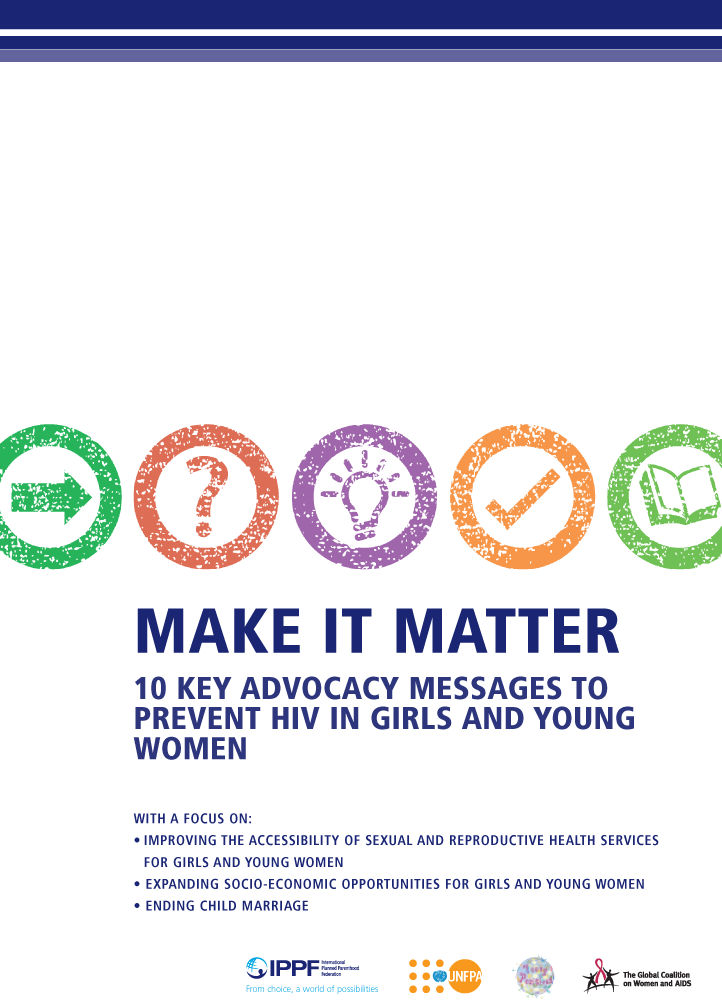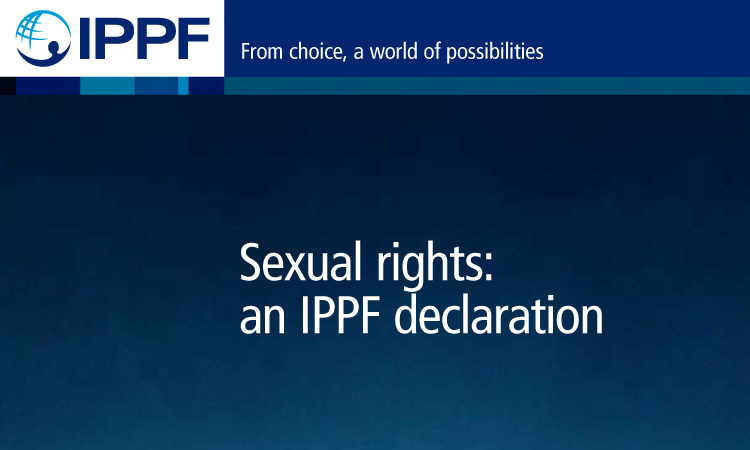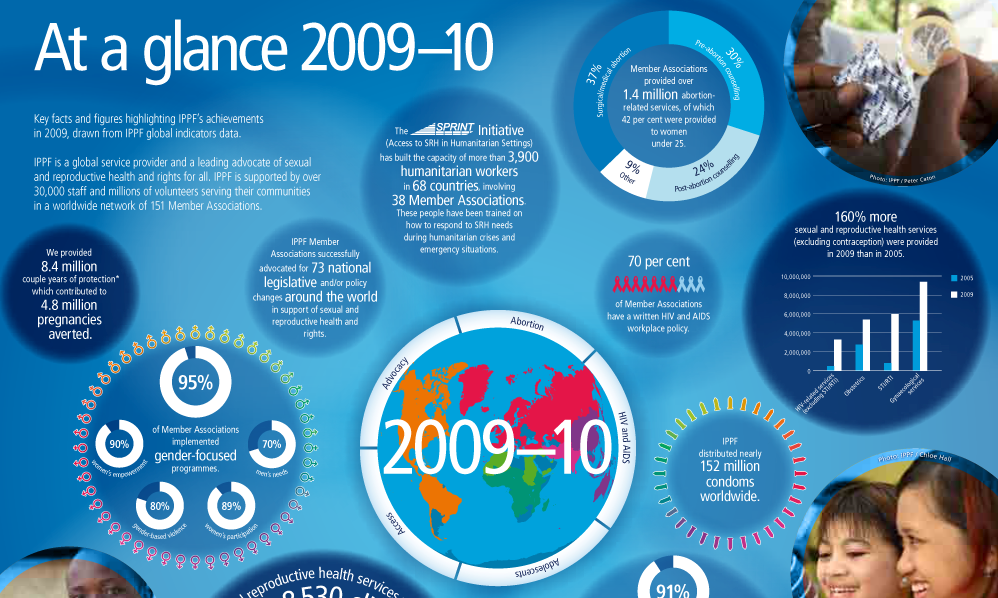
The majority of HIV infections are sexually transmitted or are associated with pregnancy, childbirth and breastfeeding.
Our work links prevention with treatment, care and support, reduces HIV-related stigma and discrimination, and responds to unique regional and national characteristics of the epidemic.
Articles about HIV and STIs

Make it Matter: 10 key advocacy messages to prevent HIV in girls and young women
This advocacy guide focuses on 3 goals that evidence shows to be part of an effective response to HIV prevention for girls and young women. These goals are: improving the accessibility of sexual and reproductive health services; expanding socio-economic opportunities; and ending child marriage.
A Window into a World: HIV risk and vulnerability
The photographs in this journal are educational and enlightening, explicit and enigmatic, moving and disturbing, beautiful and optimistic. This glimpse into a handful of lives paints a picture of life, love, learning and living with HIV. They provide a window into a world that is often neglected or hidden from our sight. A world of men and women who are particularly vulnerable to or at risk of HIV.
IPPF Strategic Framework: 2005 - 2015
The product of a Federation-wide consensus, this framework brings together the ideas and experience of IPPF Member Associations, senior volunteers, Regional Offices and Central Office, and has been approved by the Governing Council. By combining an understanding of our past with a vision for our future, this new plan presents a 'framework of opportunity' that Member Associations can interpret to develop the most appropriate response to specific sexual and reproductive health challenges. The ‘Strategic Framework’ is not intended to impose a rigid set of rules or constraints. Rather, it embraces the diversity of situations Member Associations and regions face. While providing this flexibility, the framework unites the Federation in a common vision on which we are compelled to act if we are to meet the needs of women, men and young people throughout the world.

Rights of People Living with HIV: A guidance package
Imperatives of both human rights and public health require that health care and legal systems support the sexual and reproductive health and rights of people living with HIV. This Guidance Package, developed by people living with HIV, describes the important issues and key areas for change. Going forward, legislators, government ministries, international organizations, donors, and community - and faith-based organizations - with the continued input and guidance of people living with HIV, must work together to put in place the services and legal supports that will build better sexual and reproductive health for everyone.

IPPF Sexual Rights Declaration Pocket Guide

Sexual Rights: An IPPF declaration (abridged)
The IPPF declaration is grounded in and informed by international agreements such as United Nations Conventions. This abridged version to be used in conjunction with IPPF's original Sexual Rights Declaration.

HIV Works
The training content and exercises described in this guide are meant to offer ideas and inspiration for implementing your own HIV workplace policy. It is not an exhaustive guide and there are other training manuals that you may also wish to use to supplement this guide.

Sexual Rights: An IPPF declaration
Sexuality is a natural and precious aspect of life, an essential and fundamental part of our humanity. For people to attain the highest standard of health, they must first be empowered to exercise choice in their sexual and reproductive lives; they must feel confident and safe in expressing their own sexual identity. Today, discrimination, stigma, fear and violence pose real threats to many people. These threats and the actions they trigger – ranging from disheartening to life-threatening in nature – prevent many people from attaining basic sexual rights and health. IPPF is committed to fulfilling its goals through an approach that embodies the principles of universality, interrelatedness, interdependence and indivisibility of all human rights. We will do all we can to ensure that sexual rights – human rights – are respected through our own service provision and advocacy, and also in the wider public sphere. Sexual Rights: An IPPF Declaration represents the culmination of more than two years of work that spanned the globe. Its development was guided by a diverse group of individuals: internationally-renowned experts in sexual and reproductive health, human rights, law and public health; senior IPPF volunteers, each of whom brought unique regional perspectives and who together represented a range of experience and strengths; and three senior directors of the IPPF secretariat. The Declaration developed through regional meetings and events that took place across the Federation and built on the IPPF Charter of Sexual and Reproductive Rights. While there has already been some progress toward meeting the Millennium Development Goals and the targets of the 1994 ICPD (International Conference on Population and Development) Programme of Action, there is still much work to be done. Sexual rights are a component of human rights, they are an evolving set of entitlements related to sexuality that contribute to the freedom, equality and dignity of all people, and they cannot be ignored. We must persevere; we must be uncompromising and passionate in our efforts to decrease stigma and improve access to services, and to increase recognition of sexuality as a positive aspect of human life. Marginalized groups such as young people, transgender people, sex workers, men having sex with men, people who are gay, lesbian or bi-sexual, child brides and girl mothers particularly need our compassion. The Declaration applies equally to girls and women who are vulnerable to or have been subjected to gender-based violence, including traditional norms such as female genital mutilation and discrimination based on male preference. Sexual Rights: An IPPF Declaration is an indispensable tool for all organizations, activists, researchers, policy- and decision-makers who are working to promote and ensure human rights. The Declaration will enable members of the sexual and reproductive health and human rights communities to create change and build on the momentum that has already begun around sexual rights in preparation for the next International Conference on Population and Development in 2015. Too often denied and too long neglected, sexual rights deserve our attention and priority. It is time to respect them. It is time to demand them. We trust that the Declaration will serve you well on the journey ahead.

What Do I Do If... Ideas for young women living with HIV
What do I do if I am living with HIV and...Some ideas for young women living with HIV answers common questions asked by young women living with HIV emphasises the rights of people living with HIV to information, treatment, and respect links to further sources of information encourages young women to make positive choices and stand up for their rights recognises the diversity of young women’s experiences and desires "You have the right to choose whether or not to marry, have sex, and to freely express your sexual orientation and gender identity. Living with HIV should not limit the possibilities you have to love and be loved." Answers to questions raised by young women living with HIV, with practical rights-based information about dating and relationships; disclosing and HIV status; protecting a partner and safer sex; planning healthy pregnancy; preventing pregnancy and safe abortion; and seeking support for rights violations and discrimination. Includes: some tips for sharing your HIV status with your partner(s) a checklist of ways to protect yourself from other STIs and your partner from HIV some tips for negotiating safe sex some tips to help you conceive safely some tips to help you have a healthy pregnancy for you and your baby tips on how to get help if you need it, including if your rights have been violated How to get help if your rights have been violated p.10

At a Glance 2009
IPPF's At a Glance series provides a snapshot of service delivery and achievements of the Federation's achievements in the past year.
Pagination
- Previous page
- Page 17






